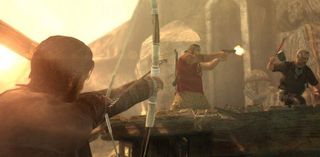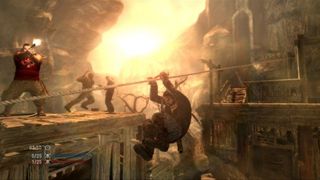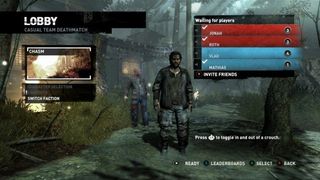Tomb Raider multiplayer hands-on: a rare treasure or cheap trinket?

Does Tomb Raider need multiplayer? Perhaps from the publisher's perspective it may be a good way to avert a swift death-by-trade-in, but such cold financial imperatives aside, doubts remain. So it's heartening to discover that, whatever the motives behind its inclusion, this is no perfunctory deathmatch addendum.
“We wanted to make a multiplayer that didn't feel tacked on,” says Daniel Bisson from Eidos Montreal, who are handling multiplayer while Crystal Dynamics focus on the story. “It has to feel like part of the same experience, so we brought in the tools and mechanics of the single-player.”
There are two sides: the survivors and the scavengers. The former includes Lara Croft herself (although you need to be level 60 to unlock her) and her crew. The latter is a band of savage pirates who, in single-player, serve as the bad guys. Each faction has different strengths and weaknesses, making the multiplayer fashionably asymmetric. Scavengers, for example, can't kill survivors outright; once they've stripped their health away, they have to charge in and finish them off with an axe. “Lara and the survivors don't know the environment,” says Bisson. “That's why each team has a different skill set.”

The mode I played was a variation of capture the flag. The survivors have to deliver 5 medpacks to a designated point, and the scavengers have to stop them by racking up 20 kills. It's clear from the start that teamwork is important here. The map is small, but the moment you pick up a medpack as a survivor, the other team is alerted to your position. You need buddies around you to take them out. “You can be a lone wolf, but the magic happens when you start working closely with your team.”
As a scavenger, though, it's a lot simpler. The map I played has a lot of verticality – which is where the classic Tomb Raider climbing mechanics come in handy – and my prefered tactic was to perch on a raised platform near the drop point and fire arrows at the survivors as they tried to deliver their package. The asymmetry gives the game an interesting rhythm compared to most run-and-gun online shooters. “You can play the way you want,” says Bisson. “If you want to avoid combat and trigger traps, you can. You can ambush people, using the map against them. There are so many ways to help your team, either alone or in a group, which reflects the variety of single-player.”
Any team can set traps. You'll find them scattered around the level, and they're an entertainign way of dealing with pursuers. A rope snare in a narrow tunnel is perfect for luring an unsuspecting player into. The trap will wrap around their ankles and yank them into the air, rendering them helpless. There are environmental traps too that you can trigger by shooting them, like collapsing a roof on someone's head. This makes the maps feel more dynamic than the usual static arenas of an online game. “The important thing for us is risk versus reward. Every time you take a risk, you should be rewarded.”

Another thing the big publishers love is accessibility, and Tomb Raider's multiplayer has been designed to be as welcoming to new players as possible. So much so that you're actually rewarded for playing badly. There are bonuses for negative things, like dying a lot, so you're always progressing through the Call of Duty-style XP system. “It's like Mario Kart. Even if you're pretty good, a less skilled player can still take you out with a blue shell. This narrows the gap between veterans and newbies.”
The biggest gaming news, reviews and hardware deals
Keep up to date with the most important stories and the best deals, as picked by the PC Gamer team.
The problem with online modes being added to games that don't really need them is that people stop playing. For the first two weeks, the servers are buzzing, then there's a pretty significant drop-off. Eidos Montreal, who are handling the multiplayer component of Tomb Raider, say they recognise this, and are designing the game to have a long shelf life: from the persistent upgrade system and DLC, to a robust matchmaking system. “We want to have really strong matchmaking. We'll also have modes where the host can tweak variables, like how many kills or medpacks are required to win a round.”
Maybe Tomb Raider doesn't need multiplayer. But if it's going to have it, then this is far from a disastrous implementation. The shooting feels a bit loose and floaty, but the frantic pace and mix of abilities and objectives are entertaining. Eidos Montreal are a talented studio, and Bisson seems utterly convinced that it's worth your attention. I'll have to play more before I decide for myself.
If it’s set in space, Andy will probably write about it. He loves sci-fi, adventure games, taking screenshots, Twin Peaks, weird sims, Alien: Isolation, and anything with a good story.
Most Popular

